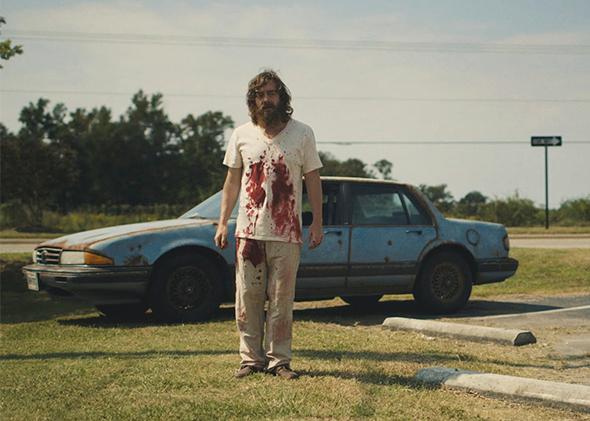Alfred Hitchcock’s Torn Curtain (1966) is a stiff, somewhat unengaging Cold War espionage movie with one justly famous scene: In the barren kitchen of a farmhouse near Berlin, Paul Newman’s American spy and a terrified German housewife (Carolyn Conwell) do away with an East German agent the hard way. After trying and failing to stab the man to death, they beat him with a shovel, attempt to strangle him and, finally, drag his still-struggling body to the oven, where they turn on the gas, push his head in, and wait. It’s a darkly comic scene about the sheer difficulty of killing someone, the physical and moral toll violence takes on its perpetrators as well as its victims. I thought of this Torn Curtain scene often while watching Jeremy Saulnier’s tense revenge thriller Blue Ruin, not because Saulnier was consciously citing it (the cinematic genes being expressed here come via the Coen brothers and Quentin Tarantino, or, going back a generation or two, Michael Mann and Sam Peckinpah), but because much of Blue Ruin shares both that scene’s sick sense of humor and its canny subversion of our action-movie expectations.
Blue Ruin is a Clint Eastwood vigilante fantasy with an anti-Clint at its center—small-statured, round-faced, nervous Dwight (Macon Blair), whose burning desire to avenge the long-ago murder of his parents doesn’t make him one whit less terrified of actually doing it. When we meet him, Dwight is homeless, reclusive, and possibly mentally ill, living out of the beat-up blue Pontiac that gives the film its title, occasionally breaking into strangers’ houses while they’re gone to take a shower and raid the refrigerator for food. A kindly police officer (Sidné Anderson) brings Dwight into the station to break some bad news: the man who killed his parents, Wade Cleland, has just been released from jail.
In the time most revenge thrillers take to establish their protagonist’s motive for taking out the bad guy, this one has dispensed with him entirely: in a bloody, snafu-laden struggle in a bar bathroom, Dwight manages to take out Cleland before the 20-minute mark. But there are more Clelands to contend with, a whole pack of angry siblings, widows, sons—and especially given that he’s left his car keys at the crime scene, Dwight has his work cut out keeping a step ahead of them as they hunt him down with a family arsenal that starts with bows and arrows and goes from there. The last two-thirds of the movie traces an escalating spiral of violence, as the Cleland clan rallies its forces to come after not only Dwight but his sister (Amy Hargreaves), a suburban mother of two.
Blue Ruin’s fierce narrative momentum derives from the inexorable logic of eye-for-an-eye reciprocity. Once the vengeance machine has been put in motion, there’s no stopping it—not even when Dwight learns that the story he’s told himself all his life about his parents’ death may not have been the truth. In scene after scene, we watch Dwight try to embody the virtues of the action hero—stoicism, determination, ruthlessness—only to run up against the limits of ordinary unheroic reality. When an arrow shaft is embedded in his leg during an ambush, he attempts to pull it out and treat his own wound, Schwarzenegger-style; a cut to him limping through the doors of an emergency room lets you know how that ended. Instead of being impressed with her brother’s DIY justice, his sister is furious at his irresponsibility for endangering her family. “I’d forgive you if you were crazy,” she tells him when he meets with her to break the news that she has to skip town. “But you’re not—you’re weak.” The final standoff, in which Dwight lies in wait for the return of a houseful of heavily armed Clelands, breaks down the distinction between strong and weak, righteousness and evil, self-defense and murder. It’s a post-moral free-for-all during which the participants, like the audience, seem to be dazedly asking themselves, How the hell did we get here from there?
Devin Ratray, who played one of Will Forte’s hulking doofus cousins in Nebraska, has a standout small role as an old high school friend of Dwight’s who’s only too happy to share his locker full of weapons. But it’s Macon Blair, a baby-faced 39-year-old with a piercing, slightly bug-eyed gaze, who keeps you nailed to your seat, rooting for this ambiguous would-be good guy even as his claim to that title grows more and more tenuous. Blair and Saulnier are childhood friends who have been making violent action movies together on very little money since they were kids with a Super 8 camera and a briefcase full of fake cocaine. Blue Ruin, their second feature film together, was made for the impressively unprincely sum of $425,000, a portion of it raised on Kickstarter, but it looks and sounds great, with a moody blue-green palette and a sparingly used but unsettling score by the lead actor’s brothers, Will and Brooke Blair. You’ll be hearing more from these gentlemen. They’ve produced a mature meditation on the wages of violence that’s also a fully functioning go-for-broke action thriller, and—unlike Paul Newman in that Torn Curtain scene—they’ve made it look easy.
